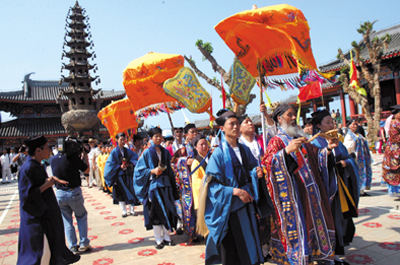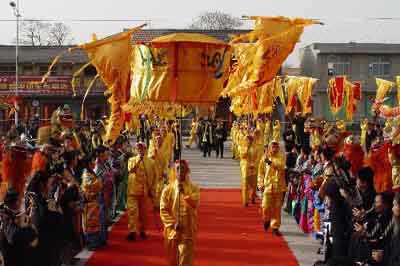On those dates, the Fasting and Sacrificial Ceremonies are held and the alter is set up for Taoists to chant sutras. When the "birthday" of Lord Bixia arrives, there are multitudes of pilgrims who come to Tai Mountain to offer incense and to pledge a vow. On the twenty-eighth day of the third lunar month, the "birthday" of the Great Emperor of Tai Mountain, a large-scale temple festival is recognized. This special Taoist ceremony has been recognized ever since the Song and Yuan Dynasties.
Thursday, May 15, 2014
Taoist Festivals
Taoism using the term "birthday" of gods and immortals as festivals. The ninth day of the first lunar month of every year is considered as the "birthday" of the Jade Emperor of Heaven, the nineteenth day of the first lunar month is considered as the "birthday" of Qiu Chuji and the eighteenth day of the fourth month is considered as the "birthday" of Lord Bixia, etc.
On those dates, the Fasting and Sacrificial Ceremonies are held and the alter is set up for Taoists to chant sutras. When the "birthday" of Lord Bixia arrives, there are multitudes of pilgrims who come to Tai Mountain to offer incense and to pledge a vow. On the twenty-eighth day of the third lunar month, the "birthday" of the Great Emperor of Tai Mountain, a large-scale temple festival is recognized. This special Taoist ceremony has been recognized ever since the Song and Yuan Dynasties.
On those dates, the Fasting and Sacrificial Ceremonies are held and the alter is set up for Taoists to chant sutras. When the "birthday" of Lord Bixia arrives, there are multitudes of pilgrims who come to Tai Mountain to offer incense and to pledge a vow. On the twenty-eighth day of the third lunar month, the "birthday" of the Great Emperor of Tai Mountain, a large-scale temple festival is recognized. This special Taoist ceremony has been recognized ever since the Song and Yuan Dynasties.
Subscribe to:
Post Comments (Atom)


No comments:
Post a Comment